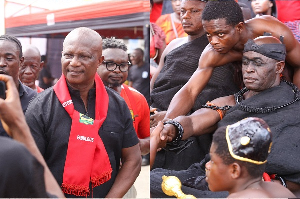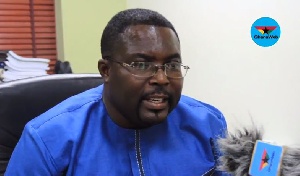A group of Ghanaian and Nigerian nationals has petitioned a local court in Trinidad to stop their deportation because they are likely to contract the deadly Ebola virus.
The West Africans, according to Immigration officials, entered Trinidad illegally and must be deported.
Henry Mensah and Ernest Aglago, both of whom illegally entered Trinidad from Ghana, are appealing a decision to deport them and their appeals were dismissed, after which they petitioned the United Nations seeking Refugee Status since Trinidad was a party to the UN Convention on the Status of Refugees.
The two Ghanaian nationals sought judicial review of the decision to deport them on the basis that if deported they would suffer death as a result of the Ebola virus, StarrFMonline.com understands.
They stated in their applications that Ebola was to be compared to the Bubonic Plague that wiped out a third of Europe’s population in the 14th century.
But the judge who sat in a marathon session from Saturday evening to early Sunday, Justice Ricky Rahim, held that Ghana was not one of the African countries afflicted with Ebola and found that based on their case file, they could not make out an arguable case for judicial review with a likelihood of success.
Both applications were dismissed with costs to be paid by the two.
Another Ghanaian, Abdullah Techie entered Trinidad illegal sometime in 2003. One year later, he married a Trinidad and Tobago citizen. Techie was granted temporary residence status by Immigration officials and in 2011, he traveled to the United Kingdom where he was arrested for possession of a prohibited drug.
He was found guilty and was sentenced in the UK to a term of 54 months. Techie was deported to Trinidad and was arrested by Immigration officers there. He argued that he had not voluntarily abandoned his residence as a result of his prison term in the United Kingdom.
His application was dismissed during an all night sitting Saturday evening into yesterday morning when attorneys for the Chief Immigration Officer produced his Order for Deportation.
Justice Rahim, who heard the application, found that there was lawful authority for Techie’s detention.
Also in the dock was Seidu Abdulai, of Ghana, he admitted to entering Trinidad illegally but could not recall when. His Trinidadian wife Sandra Charles said she met Abdulai and they fell in love after which they got married on July 7, 2012. Abdulai was arrested in 2013, and was taken before the magistrates’ court where he pleaded guilty and was fined $5,000. He paid the fine and was released. He claimed he had a permit from the Minister of National Security allowing him to stay in the country and it was unlawful for him to be deported while he had the permit. He petitioned the Ministry of Justice for a Presidential Pardon but this was denied.
No permit was ever produced to the court and on the documents. Rahim found that he did not have any permit to stay in the country and had not established a strong arguable case.
In the case of Abdul Raheem Suleiman, also of Ghana, he argued that it was unlawful for him to be deported while he had an appeal pending before a special inquiry. His judicial application was also dismissed for the same reason as the others as was the application of Olatunji Thomas Adams, of Ghana.
In the final application before the court, Richard Ofori Appiah entered Trinidad some 11 years ago. He was convicted on February 25, 2011 for being in possession of a passport with a fraudulent stamp. After representations were made on his behalf he was granted permission to leave the country voluntarily. He then sought to pursue an application for permanent residency.
Sources said Immigration officials were forced to open the Immigration Department’s offices at midnight on Saturday night to produce to the court documents to prove that permission to Appiah had been revoked and there was in place a lawful deportation order for him.
Representing the State at the marathon session of the High Court and Court of Appeal were Gerald Ramdeen, Neil Byam and Rajiv Chaitoo. The African nationals were represented by attorneys Fareed Scoon and Richard Issac.
Diaspora News of Monday, 8 December 2014
Source: starrfmonline.com

















